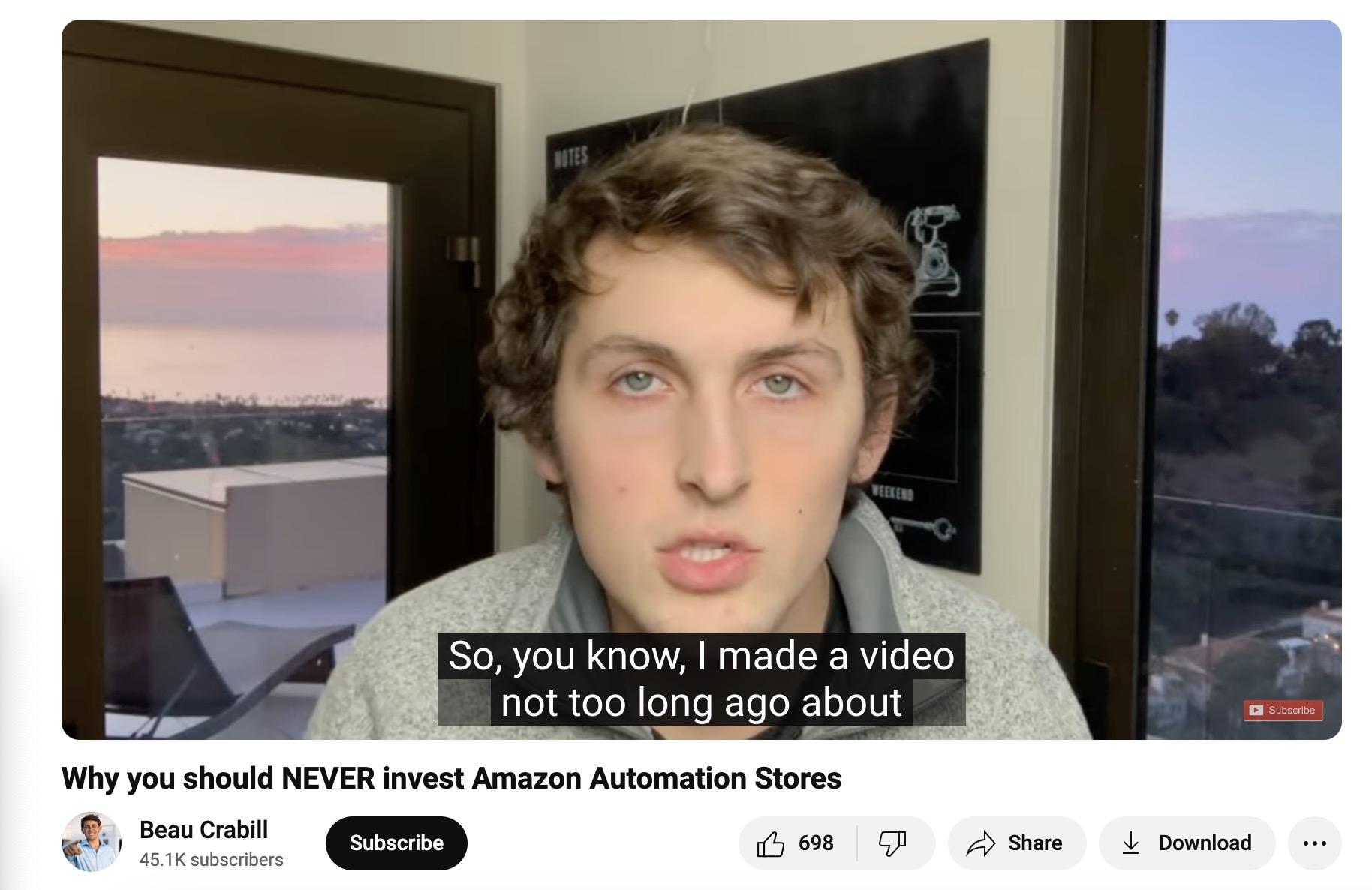“We do the heavy lifting so you can do the easy living”. Push AMZ wants to let you know that they’ll do all the work, so you can sit around and wait for money to flow. It sounds too good to be true. But founders Chase and Luis assure you it isn’t. They promise a 5-step fail-proof process. All you need to do is book a one-on-one call with the Push AMZ team. They’ll walk you through the process, from building your e-commerce store to collecting your first profit.
As a stay-at-home mom, juggling kids and a side hustle while maintaining a clean home, I need a low-maintenance but quick-income biz. Push AMZ offers an automation service that builds, manages, and scales the Amazon store for you. It’s for people who want an Amazon biz but don’t want to learn the basics of building and running a store. Push AMZ promises a lucrative income opportunity, but is it a good fit for moms? This Push AMZ review will answer that. I’ll also cover everything you need to know about the course, the creators and their backgrounds, and the inclusions of the program.
Push AMZ is a full-service Amazon automation company that builds, manages, and scales profitable Amazon stores. It’s the turnkey solution for people who want an online side income but don’t know where to start. Luis and Chase are looking for investors who want to grow their money through DFY Amazon stores. And, it’s okay if you don’t have time to manage because they’ll cover that for you too. All you need is money to invest. But, how much do you need exactly? The sales page doesn’t say how much the total program costs. You need to book a call for that. Some sources say the initial investment is around $40,000 plus a $30K loan credit to start your Amazon store. There’s also a $39.99 fixed subscription fee for the professional FBA account. Once your store makes money, they’ll take a profit share off your income. As the investor, the Push AMZ team will give you
constant, transparent, and prompt communication,
real-time reports,
access to analytics and risk monitoring data and,
honest, dedicated, and swift support service.
Push AMZ was founded by Luis Millan, Chase Alley, and Mac Ismail (CEO and chairman) in June 2021. Fortune 500 marketer, Jonathan Maxim of Earnflo, also joins as the company’s revenue and marketing officer. Mac and Luis have been in e-commerce for a while and have worked on over 150 Amazon and Walmart automation campaigns. They’re currently managing a team of 100+ employees, 120 active investors. Mac is a successful entrepreneur with businesses around the world. His background is in Electrical and Facilities Management. He has been the director of Bentley Development Group since 2010 and IGS FM since 2014. Luis Millan is Push AMZ’s chief operating officer. He’s a business consultant and an e-commerce professional who specializes in CRM and operations management. There’s not much said about his education or business background aside from being a co-founder of Push AMZ. Chase Alley specializes in SEO, logistics, and international commerce. He’s been an Amazon store owner since 2014. Chase has several successful businesses, including strategic partnerships and joint ventures. With Jonathan Maxim on board, Push AMZ is a powerhouse of entrepreneurs who have built successful online businesses across different niches.

Push AMZ and Amazon Automation Business Model
Looking at the website and testimonials, Push AMZ appears to be legit. The founders are successful entrepreneurs with solid business backgrounds. There are also testimonials on the website from seemingly satisfied customers. One is from an investor, Solomon Lacey, who commended the support team for doing a great job in his store’s daily operations. Another is Joe P. who said he’s okay with Push AMZ’s profit-sharing scheme because he doesn’t have to do anything. No new skills to learn and everything is done for him.
What’s intriguing is that there aren’t many reviews that talk about Push AMZ. Digging deeper, I found that Better Business Bureau rates it only 2.3 stars. It’s also not BBB-accredited. This could be influenced by many factors. Probably the course doesn’t have too many enrollees. Or, the company makes investors sign a non-disclosure agreement (NDA). One investor said he was promised that he would recoup his $30K investment in just 6 months. But 10 months later, the Amazon store wasn’t profitable, and he was incurring additional expenses. His accumulated loss totaled $45K. No refund or reimbursement was granted. This is the biggest downside of this biz. When everything is done for you, all you can do is wait for your fate to unfold. I’m not saying this business model couldn’t work because, technically, it does. However, most investors struggle to break even on their initial investment. And it’s pretty obvious why.
This business model is designed to make the Amazon service agency rich. The program alone is very expensive ($40K upfront capital). According to sellerapp, Amazon FBA sellers make a 15% to 20% profit margin. Anything above 20% is considered excellent. A JungleScout report shows that 50% of Amazon FBA sellers make $1,000 to $25K monthly. Taking the conservative average, it will take about 3.3 years before you recuperate the cost of the course. And they’re not stopping at that. Push AMZ also takes a profit share when your store starts making a positive cash flow, as if the margins aren’t slim enough.
Amazon automation service companies are notorious for their overly optimistic timeframe. Push AMZ promises ROI in just 6 months, but statistics tell a different story. According to Trueprofit, only 24% of Amazon sellers are profitable in their first 3 to 6 months of business. The same report also shows that 62% of these sellers only make $5,000 or less annually. Only 5% of sellers make $50K to $100K per year. Technically, Push AMZ isn’t lying. It is possible to ROI before your first year. But with everything automated and outsourced, your chances are slimmer than usual.
Push AMZ Review On YouTube

Beau Crabill gives his honest feedback on Amazon automation stores. He starts by saying DFY Amazon stores are scams and many people have lost money because of it. The most common issues with automated Amazon stores are account suspensions and locked-up funds. Beau also emphasized that a DFY store is impractical because the margins are low and competition is high. Most automation agencies make unrealistic promises about the returns on their investment and use fake testimonials to lure more people into their programs.
Is Amazon Automation A Good Business For Moms?
Amazon automation might not be a good business for moms. Opening a digital storefront exposes you to many risks, especially when the process is outsourced or automated. Lack of control is the biggest risk when getting a done-for-you Amazon automation service. It may feel like you’re taking a shortcut when other people do the work for you. But, in reality, you never know what happens in the background. The agency can manipulate store reports and take bigger chunks of your profit without your knowledge. Agencies like Push AMZ may not be fully transparent about other fees, just like what the BBB complainant reported. Automated Amazon accounts are prone to suspensions. Stores that consistently get poor customer ratings and high return rates may get suspended and funds might get withheld for up to three months.
If you’re looking for a low-capital, low-maintenance, and less-complicated business model, go for local lead generation. This business model teaches how to rank and rent digital properties. You own the digital properties, so you don’t have to outsource any part of the process. With local lead gen, you have full control of the biz. You don’t have to worry about account suspensions or funds getting withheld. It’s a lucrative market with high-income potential, and it’s low maintenance. Perfect for stay-at-home moms.

0 comments